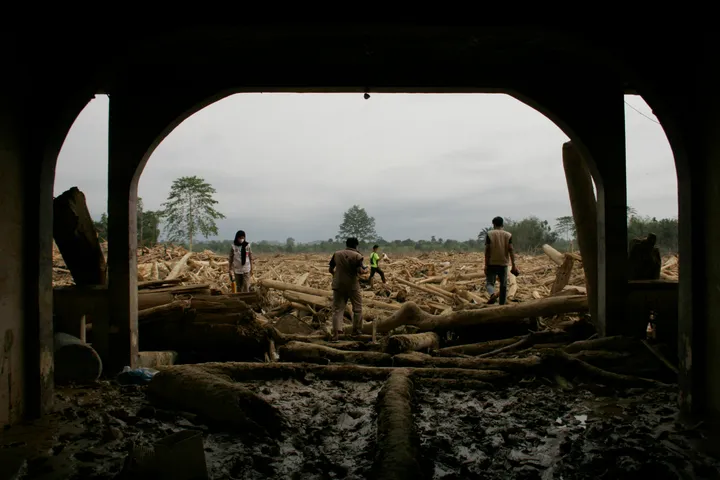Migration has always been woven into the fabric of human history – from the time the first human ancestor stepped out of Africa in search of new land and life nearly two million years ago.
In modern times, individuals seeking better possibilities remain a part of the dynamic pattern of international migration, whether escaping conflicts and violence or environmental degradation, the climate crisis, and more.
As the world observes International Migrants Day on December 18, here's a closer look at several key global statistics of what is today considered a growing humanitarian crisis.
Based on numbers from the World Migration Report, there were about 281 million international migrants in 2021, a 27 percent increase compared to 2010 when there were 221 million migrants who had made cross border travels.
So far this year, 2,500 people have died or gone missing while trying to cross the Mediterranean to Europe, while some 186,000 people have arrived in European countries during the same period, the United Nations High Commissioner for Refugees said in September.
In Europe, reduced migration is a top priority, with Austria leading the list of countries in the region, according to a survey by the non-profit organisation Alliance of Democracies.
The Democracy Perception Index 2023 surveyed almost 54,000 people in 53 countries and found that 19 percent of respondents in Europe favoured curbing migration, while only 12 percent worldwide ranked reducing migration among the top three issues their government should focus more on.
The highest scores of all 53 countries surveyed are Austria (34 percent), Germany (31 percent), the Netherlands (30 percent), France (28 percent) and Sweden (27 percent). Conversely, countries such as the Philippines (3 percent), Indonesia (3 percent), Kenya (2 percent), Brazil (1 percent), and Nigeria (1 percent), ranked reducing migration as less of a priority.
Anti-immigrant sentiments are reportedly on the rise despite studies showing that immigrants contribute to growth in countries they come from as well as move to.
The World Development Report 2023: Migrants, Refugees, and Societies state populations across the globe are ageing at an unprecedented rate, making many countries increasingly reliant on migration to realise long-term growth potential.
Well-off countries, as well as a growing number of middle-income countries—traditionally among the main sources of migrants—face diminishing populations, says the report, intensifying the global competition for workers and talent.
At the same time, most low-income countries are expected to see a boom in population, leading to more push to create jobs for young people.
"Migration can be a powerful force for prosperity and development," said World Bank Senior Managing Director Axel van Trotsenburg. "When it is managed properly, it provides benefits for all people — in origin and destination societies."
Major mass migrations now underway include:
- The Eastern Mediterranean route
- The Mediterranean Sea route
- Central American route
- Southeast Asian route
Growing anti-immigrant sentiment
The win of Geert Wilders's far-right Party for Freedom (PVV) in the Dutch elections has elicited fears of Islamophobia and harsher immigration control after Wilders vowed to bring an end to a "tsunami of asylum and immigration" in his victory speech in November.
Vowing to bring an end to a "tsunami of asylum and immigration", Wilders rode a wave of anti-immigrant sentiment, pinning the blame on asylum seekers and immigrants for the lack of housing, rising cost of living, and overburdened healthcare system in the country.
In Britain, lawmakers have voted to support the government's controversial proposal to transfer irregular refugees and asylum-seekers in the country to Rwanda.
British courts initially ruled last month that the plan was illegal as the East African country may not be safe for migrants, who could potentially be forced to return to places where they face persecution.
Human rights groups have echoed this sentiment, calling the proposal unethical.
The result of the vote is "a defeat for human decency and a hammer blow for the rule of law," according to UK Director of Human Rights Watch Yasmine Ahmed.
"A government willing to subvert the rule of law by breaching human rights and undermining judicial oversight is a dangerous prospect," Ahmed added.
In 2022, Rwanda agreed to process and settle hundreds of asylum-seekers a year from the UK, costing British Prime Minister Rishi Sunak's government at least $300 million in payments thus far.
Italy, one of the first countries reached by immigrants to Europe due to its strategic position in the Mediterranean Sea, recently adopted a tougher stance on immigration, giving authorities the power to detain migrants for as long as 18 months.
Italian right-wing Prime Minister Giorgia Meloni, who mostly campaigned on anti-immigration rhetoric, also announced a plan to build new detention centres to hold migrants for the duration of the time, following news of thousands of migrant arrivals in the southern Italian island of Lampedusa in September.
"In the past 48 hours, around 7,000 people have arrived in Lampedusa, which has always welcomed them with open arms," Mayor Filippo Mannino told Italy's RTL 102.5 radio, as reported by Reuters. "However, we have now reached a point of no return, and the island is in crisis," he said, adding," Europe and the Italian state must step in immediately with a rapid support operation and swift transfer of people."
Africa and South Asia are among the most frequent origin countries for immigrants based on data on the nationalities declared upon arrival by Statista. In 2022, Tunisia, Bangladesh, Egypt, and Syria were the four most common countries of origin, making arrivals from Africa, the Middle East, and South Asia have the highest share of nationalities receiving refugee status in Italy.
The French government intends to implement similar tough measures against undocumented migrants.
Advocacy organisations have criticised the flagship immigration bill, which was rejected in the lower house of parliament, as a threat to the rights of asylum seekers and other migrants, saying the nation relies on migrants, including undocumented workers, in many of France's industries.
Both the far-right and far-left have criticised the bill for opposing reasons after French President Emmanuel Macron's government proposed steps to limit undocumented people and improve migrant integration.
In Europe, the politics in Sweden, Germany, and Spain also appear to be dominated by spats about identity and immigration.
Australia's Prime Minister Anthony Albanese, meanwhile, has said the country's migration numbers needed to be wound back to a "sustainable level," adding that "the system is broken."
As the government looks to overhaul its migration system, Australia on December 11 said it would tighten visa rules for international students and low-skilled workers that could cut its migrant intake in half over the next two years.
In November, the highest court in Australia overturned the country's decades-old, controversial practice of indefinitely detaining asylum seekers following a case that centred on a Rohingya man potentially facing lifelong detention.
Meanwhile, Rohingya refugees continue to face rejection from the shores of Southeast Asian countries such as Indonesia.
More Rohingya families are finding camp life tougher and leaving refugee camps in Bangladesh as hopes of returning to Myanmar grow distant.
Most refugees who left the camps by sea have attempted to reach Malaysia, but many have ended up in Indonesia. Local residents in Indonesia, however, have rejected a couple of landing attempts by a boat carrying Rohingya asylum seekers.
According to Indonesia's Ministry of Foreign Affairs, the country is not a party to the 1951 Refugee Convention and, therefore, is not obligated to accommodate refugees or provide a permanent solution.
The Ministry's spokesperson, Lalu Muhamad Iqbal, said, "Accommodation has been provided solely for humanitarian reasons. Ironically, many countries party to the convention actually closed their doors and even implemented a pushback policy toward the refugees."
























